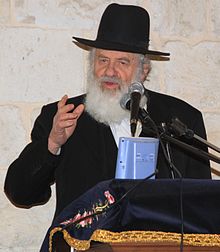Uri Zohar
Uri Zohar | |
|---|---|
 | |
| Born | November 4, 1935 |
| Education | Hebrew University of Jerusalem |
| Occupation | Rabbi, film director, comedian, writer |
| Years active | 1956–1988 |
Notable work | Hole in the Moon Three Days and a Child The Hero |
| Spouse(s) | |
Uri Zohar (Hebrew: אורי זוהר, born November 4, 1935) is a former Israeli film director, actor, and comedian who left the entertainment world to become a rabbi.[1]
Biography[]
Uri Zohar was born in Tel Aviv on November 4, 1935. In 1952, he graduated high school and did his military service in an army entertainment troupe. His first marriage, to singer Ilana Rovina, ended in divorce.[2]
By 1956, he was a popular stand-up comedian. In 1960, he studied philosophy at the Hebrew University of Jerusalem. He was sentenced to three months of community service on charges of marijuana possession.[3] In the 1960s, he directed and starred in Israeli films, among them Hole in the Moon, Three Days and a Child, Every Bastard a King, and Metzitzim. In 1976 he was awarded the Israel Prize for cinema, which he declined.[4]

In the late 1970s, through the influence of Yitzhak Shlomo Zilberman, Zohar turned to religion, becoming a Haredi Orthodox Jew and a rabbi.[5] In 1977, he began wearing a kippa on the television game show he was hosting.[3] He is active in the movement to attract secular Jews to religious orthodoxy, and uses his entertainment skills to promote this objective.[6] In the 1992 Israeli elections, Zohar directed the television broadcasts for Shas.[7]
Awards and recognition[]
In 2012, Cinémathèque Française in Paris held a retrospective of Zohar's work. The event included lectures and screenings of all his major films. Zohar was described as one of Israel's most interesting film directors due to his exploration of manhood and machismo, male-female relationships and the impact of the military.[8]
Books[]
- My Friends, We Were Robbed
- Waking Up Jewish
Films[]
- (1962)
- Hole in the Moon (1964)
- (1966)
- Three Days and a Child (1967)
- Every Bastard a King (1968)
- (1970)
- The Hero (1971)
- Metzitzim (1973)
- (1973)
- Big Eyes (1974)
- (1977)
References[]
- ^ Gershon Shafir; Yoav Peled (2002). Being Israeli. p. 148. ISBN 0-521-79672-5.
- ^ Cashman, Greer Fay (18 October 2020). "Arts pioneer Ilana Rovina dies". The Jerusalem Post | JPost.com. Retrieved 2020-12-05.
- ^ Jump up to: a b Despair and Deliverance
- ^ "Zohar Uri" (in Hebrew). The Guide to One Hundred Years of Hebrew Theatre. Retrieved 2016-11-03.
- ^ Hadar, Alon (23 August 2007) "Goodbye to All That", Haaretz. "After Ponovezh I went to the yeshiva of Rabbi Zilberman, where Uri Zohar studied, in the Old City of Jerusalem."
- ^ What I learned from a Jewish Movie Star
- ^ Uri Zohar bio
- ^ French Cinematheque to honor Uri Zohar with retrospective, Haaretz
External links[]
- 1935 births
- Living people
- Male actors from Tel Aviv
- Film people from Tel Aviv
- Israeli male film actors
- Israeli film directors
- Israeli male comedians
- Baalei teshuva
- Orthodox Jewish outreach
- Israeli Orthodox Jews
- Jews in Mandatory Palestine
- Hebrew University of Jerusalem alumni